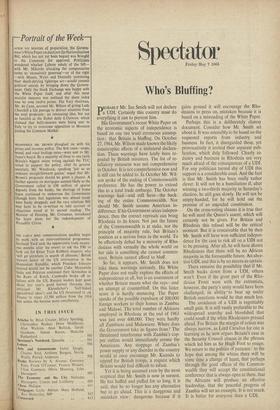Who's Bluffing?
TIROBABLY Mr. Ian Smith will not declare ra UDI. Certainly this country must do everything it can to prevent him.
His Government's recent White Paper on the economic aspects of independence is based on one (we trust) erroneous assump- tion: that Britain is bluffing. On October 27,1964, Mr. Wilson made known the likely catastrophic effects of a unilateral declara- tion. These warnings have lately been re- peated by British ministers. The list of re- taliatory measures was not comprehensive in October. It is not comprehensive now and it still can be added to. In October Mr. Wil- son spoke of the ending of Commonwealth preference.' He• has the power to extend this to a total trade embargo. The October warnings had—and still have—the back- ing of the entire Commonwealth. Nor should Mr. Smith assume American in- difference. If his Government seizes indepen, dence, then the correct reprisals can bring Rhodesia to its knees. Not just the future of the Commonwealth is at stake, nor the principle of majority rule, but Britain's position as a serious force in the world. To be effectively defied by a minority of Rho- desians with virtually the whole world on her side is something she cannot counten- ance. Britain cannot afford to bluff.
So far, it appears, Mr. Smith does not take these warnings seriously. His White Paper does not really explore the effects of independence at all, but is an assessment of whether Britain means what she says—and an attempt at counterbluff. On this latter score it is hardly menacing. The Paper speaks of the possible expulsion of 500,000 foreign workers to their homes in Zambia and Malawi. The total number of Africans employed in Rhodesia at the end of 1963 was just over 600,000. They were hardly all Zambians and Malawians. Where does the Government take its figures from? The threatened interference with Zambia's cop- per outlets would immediately arouse the Americans. Any stoppage of Zambia's power supply or any disorder in the country would at once encourage Mr. Kaunda to appeal for British troops, a request which Britain would find difficult to refuse.
Yet it is being assumed even by the most sceptical that Mr. Smith is now in earnest.
He has huffed and puffed for so long, it is said, that he no longer has any alternative but to go ahead. This is a dangerous and mistaken view : dangerous because if it gains ground it will encourage the Rho- .desians to press on, mistaken because it is based on a misreading of the White Paper.
Perhaps this is a deliberately clumsy document. Consider how Mr. Smith set about it. It was ostensibly to be based on the requested reports from industry and business. In fact, it disregarded these, yet provocatively it invited their separate pub- lication, which duly followed. Clearly in- dustry and business in Rhodesia are very much afraid of the consequences of a UDI. For any politician turned shy of UDI this support is a considerable asset. And the fact is that Mr. Smith has been really rather clever. It will not be a humiliation if, after winning a two-thirds majority in Saturday's election, he still goes slowly. He will not be empty-handed, for he will hold out the promise of an amended constitution.
On the cross-voting clauses it is true that he will need the Queen's assent, which will certainly not be given. For Britain and Rhodesia this refusal will be the critical moment. But it is conceivable that by then Mr. Smith will have won sufficient indepen- dence for the case to risk all on a UDI not to be pressing. After all, he will have shown Rhodesians that there will be no African majority in the foreseeable future. Ail abor- tive UDI, and this is by no means so certain.
There remains the possibility that-if Mr. Smith backs down from a UDI, others won't. Even if the great part of the Rho- desian Front went with the extremists, however, the party's unity would have been challenged; its ability to bear up under British sanctions would be that much less.
The avoidance of a UDI is regrettably small gain. It is still vastly preferable to the widespread anarchy and bloodshed that could result if the white Rhodesians pressed ahead. For Britain the margin of action was always narrow, as Lord Caradon for one is learning as he now argues Britain's case in the Security Council almost in the phrases which led him as Sir Hugh Foot to resign. We return to the politics of patience : to the hope that among the whites there will be some time a change of heart, that perhaps through the good offices of the Common- wealth they will accept the constitutional conference that is always open to them, that the Africans will produce an effective leadership, that the peaceful progress of Zambia will set an example. It is not much. It is better for everyone than a UDI.


































 Previous page
Previous page